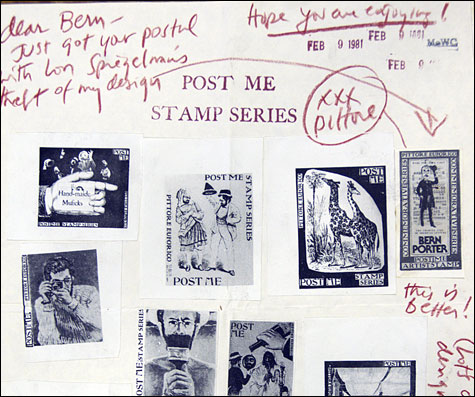
ANALOG REPRODUCTION: Carlo Pittore's correspondence. |
| "Send: Conversations In Evolving Media" | works by Meggan Gould + Alex Kahn + Jason Lewis + Carlo Pittore + Young-Hae Chang Heavy Industries | through Aug 10 | at ICA at MECA, 522 Congress St, Portland | 207.879.5742 |
The Institute of Contemporary Art at Maine College of Art describes its latest exhibition, entitled “Send,” as “Conversations in Evolving Media.” Braving the risks of a technology fetish, the artists manage to ride a line of questions, not proselytizing.Jason Lewis narrowly avoids technological gimmickry with “Intralocutor.” Two microphones dangle from the ceiling. Mirror projections line opposing walls in the darkened room. As you approach the microphones, a camera picks up your movement and sends a distorted silhouette through the projectors. As you speak, voice-to-text software crunches numbers and then lobs the words onto the screen. The colorfully animated words tumble down the walls in different directions. A feedback loop naturally begins — you are tempted to repeat the text you see, especially when the words don’t quite match up with your intentions. Movement and speech, audio and visuals align in an interactive moment meant to be shared and explored.

Meggan Gould’s “Go ogle” contains an array of images aligned in grids, all the same size, all in clean white frames. Each are composites from a unique Google image search. The results for “American Gothic” are relatively recognizable as the painting, save for some blurriness, but “Queen+of+Diamonds” delivers a fully pixelated miasma. Words as representation of the object are revealed to be as relative as their pictorial counterpart. One last grouping reveals the difference in composite search results over time. A search for “Blue” in May 2004 yields a color field like its namesake but subsequent searches over the next four years begin a road towards a cloudy brown-ish mess.
The most engaging investigation of the show’s theme is a large video and sound installation by Young-Hae Chang Heavy Industries. The work is composed entirely of animated text projected on a large screen. Each of the rotating videos is characterized by a fast pace, music that advances the artists’ intentions for mood, and an anxiety-tinged position of reflection on technology and politics. When you take the time to watch, the meandering thoughts in “Perfect Victoria: Victoria Defiled” slowly form a line of questioning concerning subject and object in an anonymous world and the vitality of online experience. In “Metablast,” a thread of comment posts on the artists’ online work is relayed one at a time until a political squabble about North and South Korea begins to consume the dialogue. Online discussion is revealed as removed from content and we see how the language of hate builds rapidly on itself.
At first glance, the correspondence of Carlo Pittore with his friend Bern Porter, lining the back walls of the main gallery in the form of paintings, postcards, and postage stamps conceived by the artist, seems outmoded and out of place in this technologically driven exhibit. However, Pittore’s collagist style serves as precursor to the theme of the show. His interruptive style of composition is evident in a large-scale portrait of Porter. The translation of this painting into postage stamps further heightens its position in the age of reproduction and reveals the artist’s easygoing prescience of increasing image proliferation in the early ’80s, when Xeroxes were all the rage.
One postcard, playfully composed of vaudevillian figures on a background of music staffs, is entitled “I Meta-Networker In Spirit,” encapsulating the position of the contemporary artist, fully realized now in a networked age. The difference between Pittore’s work and those with whom he shares the ICA show is the love and affection for his friend pouring out of each artistic gesture. If that love reenters our contemporary dialogue, we may find that the feeling of loss and confusion in the digital age is illusory.
Ian Paige can be reached atianpaige@gmail.com.